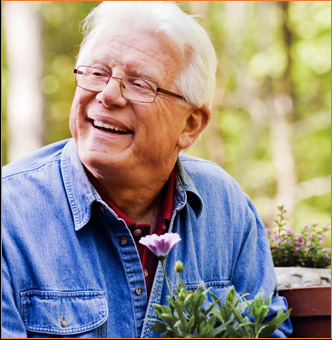Memory Care

At The Promenade, our compassionate staff understands the unique obstacles that our seniors living with Dementia and Alzheimer’s face. The 24-hour staff at The Promenade is specially trained to provide the attention and assistance your loved one needs. From the moment your loved one steps into our community, our goal is to make them feel safe, secure, and most importantly, at home.
Services and Methods
Individualized Care Tailored to Your Needs
All of our residents will have a personalized assessment performed in order to create an individual care plan prior to moving in. This care plan will be crafted with the specific needs of your loved one in mind and addresses the assistance they require on a daily basis. We understand and recognize that each of our residents has their own unique requirements for care along with personal preferences and customize each plan so that there is a unique combination of care and compassion.


Promoting Happiness, Despite Memory Challenges
Our role at The Promenade goes well beyond helping our residents perform tasks. Here, caring for each individual resident means helping them enjoy the activities that make the individual happiest – from gardening to woodworking, to helping in the kitchen. Even small successes can have a profound impact on one’s sense of purpose. We understand the concern and unpredictability that comes with an Alzheimer’s/Dementia diagnosis. Let The Promenade be a guiding light for you and your loved one in these uncertain times. If you have been searching for a Memory Care community that best addresses the needs of your loved one, we encourage you to contact us with any questions and concerns that you may have. We look forward to being a resource to you and your loved one as you move forward with your selection process.
Better methods. Better life.
At The Promenade, we utilize The Montessori Method, an approach to memory care that combines the principals of rehabilitation and education. In older adults with dementia, this has been shown to benefit both mood and mental health because the individual is engaged constructively and positively.
Activities are simple to set up and can be modified to match a person’s skillset, background, occupation or hobbies. When tasks are too easy, we’ll increase the challenge to give individuals a greater sense of pride and accomplishment. We also seek out ways in which to reconnect them with their past.
The Montessori Method is well-rounded:
Cognitive Skills: Trivia, discussions on current events, and other brain challenges stimulate cognitive abilities. For individuals with a more severe diagnosis, activities can involve simple puzzles like matching words with objects or identifying famous landmarks. Yet even this level of engagement can be modified if needed. The key is inspiring the mind to stay active.
Life Skills: While short-term memory can fade with dementia, an individual’s long-term memories can remain very much intact. We can incorporate your loved one’s skills, history, and background into life skills activities. If your mom worked on a farm or had a garden, she can sort and plant seeds. If your father was a handyman, simple activities involving hand tools could reconnect him with his past. For those who were homemakers, activities like baking, folding clothes, or household chores may be ideal.
Movement: Activities utilizing a full range of motion through slow movements can be calming while also ensuring your loved one remains active. Taking into account physical limitations, this can be achieved either seated or standing. Even when seated, motions such as picking an apple from a tree or flowers from a field engage healthy, active motion.
Sensory: Sensory activities keep the whole mind alert. For smell, we use different scented items with aromas such as citrus, lavender, cherry or vanilla. For taste, we have baking classes from snack to dessert. Other times, we’ll present three different types of fruit and have them sample a bit from each to see if they can identify the fruit from taste or texture alone. For touch, we may encourage them to identify objects simply by picking them up.
Music: Often, the part of the brain identifying music is one of the last affected – making it very popular. Identifying songs, dancing with groups, or singing along with others can create a wonderful group-bonding experience. Patriotic songs and church hymns are familiar to many, despite generational differences. Other activities such as having simple interactions with music instruments, like drumming or ringing a bell, can be useful, engaging, and incorporate movement.
Art: Individuals diagnosed with dementia can still be highly creative. In addition to painting, individuals may choose a picture to draw or test their ability to copy a photo. This can even be a group activity, pairing friends, or even husband and wife together, to spark their creativity and express themselves.
Socialization: Dining is a great way to socialize because it is an activity done daily. It allows our residents to interact and share experiences. From setting the table … to having your loved one help prepare a favorite dish … or simply sharing conversation over dinner … can make everyone feel like they belong.
It all comes back to sustaining connections.
At The Promenade, connecting with residents and their families in a meaningful way is our top priority. Everything is centered on the physical and emotional wellbeing of residents. By creating a stimulating environment where they can thrive in mind, body and spirit, they are empowered to live their best lives.


